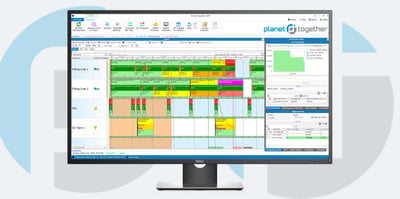Topics: PlanetTogether Software, Integrating PlanetTogether, Dynamic Resource Allocation, Optimize Resource Allocation, Enhance Operational Efficiency, Food and Beverage Manufacturing, Energy-Aware Scheduling, Optimal Batch Sizing
Optimizing efficiency isn't just about increasing output or minimizing downtime—it's also about sustainability. As industries worldwide prioritize environmental responsibility, energy-efficient operations have become a crucial focus area. At the heart of this endeavor lies the integration of advanced scheduling algorithms with leading enterprise resource planning (ERP) systems.
In this blog, we'll look into the realm of scheduling algorithms tailored for energy-efficient operations in food and beverage manufacturing facilities. Specifically, we'll explore how integrating PlanetTogether with prominent ERP solutions like SAP, Oracle, Microsoft, Kinaxis, and Aveva can revolutionize the manufacturing landscape, fostering sustainability while maximizing productivity.

Food and beverage manufacturing is energy-intensive, requiring significant resources to power machinery, maintain optimal temperatures, and facilitate processing. However, with rising concerns over climate change and resource depletion, reducing energy consumption has become imperative for businesses in this sector.
Traditional scheduling methods often prioritize output without considering energy efficiency. Consequently, production schedules may inadvertently lead to excessive energy usage, contributing to environmental degradation and escalating operational costs. To address this challenge, manufacturers are turning to advanced scheduling algorithms that optimize resource allocation while minimizing energy consumption.

PlanetTogether is a leading provider of advanced scheduling software designed to streamline production processes and enhance operational efficiency. By integrating with ERP systems such as SAP, Oracle, Microsoft Dynamics, Kinaxis RapidResponse, and Aveva, PlanetTogether enables seamless data exchange and synchronization, empowering manufacturers with real-time insights and actionable intelligence.
The integration between PlanetTogether and ERP systems revolutionizes scheduling by incorporating key factors like machine utilization, energy consumption, and production demand into the decision-making process.
This holistic approach enables manufacturers to develop optimized production schedules that not only meet customer demand but also minimize energy usage and maximize resource efficiency.

Dynamic Resource Allocation: Traditional scheduling approaches often allocate resources based on static parameters, leading to inefficiencies and energy wastage. Dynamic resource allocation algorithms, integrated with ERP systems and PlanetTogether, continuously assess production demand, resource availability, and energy consumption patterns to optimize resource allocation in real-time. By dynamically adjusting production schedules based on fluctuating demand and energy prices, manufacturers can minimize idle time, reduce energy usage, and enhance operational efficiency.
Energy-Aware Scheduling: Energy-aware scheduling algorithms prioritize energy-efficient production processes while meeting production targets and customer demand. By analyzing historical energy consumption data, production schedules can be optimized to leverage off-peak energy periods, utilize energy-efficient machinery, and minimize energy-intensive operations during peak demand hours. By aligning production schedules with energy availability and pricing, manufacturers can significantly reduce energy costs while minimizing their environmental footprint.
Optimal Batch Sizing: Batch sizing plays a crucial role in energy-efficient operations, as smaller batch sizes often require less energy for processing and result in reduced waste. Advanced scheduling algorithms integrated with ERP systems and PlanetTogether analyze production constraints, inventory levels, and energy requirements to determine the optimal batch size for each production run. By dynamically adjusting batch sizes based on real-time data, manufacturers can minimize energy consumption, reduce production lead times, and enhance overall operational efficiency.
Predictive Maintenance Scheduling: Equipment downtime due to unexpected breakdowns can significantly impact energy efficiency and operational productivity. Predictive maintenance scheduling algorithms leverage machine learning and IoT technologies to predict equipment failures before they occur, allowing manufacturers to proactively schedule maintenance activities during periods of low production demand. By minimizing unplanned downtime and optimizing equipment performance, predictive maintenance scheduling algorithms help reduce energy consumption, enhance equipment reliability, and improve overall operational efficiency.
Energy-efficient operations have emerged as a critical imperative for food and beverage manufacturers. By integrating advanced scheduling algorithms with leading ERP systems like SAP, Oracle, Microsoft, Kinaxis, and Aveva, manufacturers can optimize resource allocation, minimize energy consumption, and enhance operational efficiency.
The integration between PlanetTogether and ERP systems empowers manufacturers with real-time insights and predictive analytics, enabling them to develop optimized production schedules that prioritize energy efficiency while meeting customer demand.
As sustainability becomes increasingly important in food and beverage manufacturing, embracing advanced scheduling algorithms is essential for driving long-term profitability and environmental stewardship.
Are you ready to take your manufacturing operations to the next level? Contact us today to learn more about how PlanetTogether can help you achieve your goals and drive success in your industry.
Topics: PlanetTogether Software, Integrating PlanetTogether, Dynamic Resource Allocation, Optimize Resource Allocation, Enhance Operational Efficiency, Food and Beverage Manufacturing, Energy-Aware Scheduling, Optimal Batch Sizing
0 Comments
No video selected
Select a video type in the sidebar.







LEAVE A COMMENT